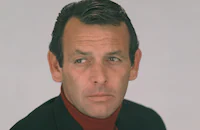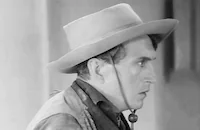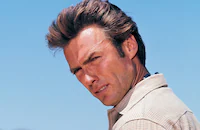Lafayette Escadrille

Brief Synopsis
Cast & Crew
William A. Wellman
Tab Hunter
Etchika Choureau
Marcel Dalio
David Janssen
Paul Fix
Film Details
Technical Specs

Synopsis
In the first year of World War I, in New England, belligerent young Thad Walker steals a car and is involved in a hit-and-run accident. Resentful of his father's outrage over the event and fearful of being arrested, Thad stows away on board a ship, joining his friends Bill Wellman, Duke Sinclair and Tom Hitchcock on their way to join the French Foreign Legion. In Paris, the boys frequent a bar popular with flyers and learn of the recent formation of the Lafayette Escadrille, an aerial unit made up of American volunteers, and decide to enlist. Meanwhile, Thad is captivated by a young, blonde girl, Renée Beaulieu, and, promising to meet the others the next day, leaves with her. The following morning after a tender departure from Renée, Thad joins the others at the air training camp at Luxeuil and within days the volunteers are drilling and taking instructions on "penguin" planes, which do not fly, but teach steering and control. The high-spirited young men continually taunt their French instructors and destroy several of the penguins in their enthusiasm. One afternoon, Thad knocks out one of the other enlistees who, upon seeing a photo of Renée, called her a "hustler." Later, Thad confides in Bill that Renée had confessed that she was indeed a prostitute, but he does not care. During drilling exercises, Thad is impatient and resentful of being prevented from flying. When Renée writes to declare that she has quit working for the madam and moved into a small apartment, Thad decides to visit her. After safely slipping away unnoticed from the camp, Thad spends a romantic evening with Renée, but becomes discouraged upon returning to the endless drilling at camp. Angered when he is reprimanded by the drill instructor one afternoon, Thad strikes the man and is placed under arrest. That night, Duke tells Bill and Tom that Thad faces severe punishment for striking an officer, and suggests they break him out. The friends agree and stage a large brawl that attracts the guards, allowing Thad to escape. Later walking along in the dark toward Paris, Thad realizes that his distinctive uniform will attract attention and stops a solitary soldier on the road to plead with him for his coat. When the soldier refuses, the men have a vicious fight. Although severely beaten, Thad reaches Renée, who, with the help of the concierge, tends to his wounds. While Thad recovers over the next few weeks at Renée's, the men of the Lafayette Escadrille continue training and are soon flying. After his recuperation, Thad grows restless as he cannot go outside in the daytime for fear of being stopped by gendarmes searching for deserters. Thad asks Renée to marry him and she agrees when they are able to get to a church. Determined, Thad finds a Bible and the couple exchange vows over it. Uncomfortable at being supported by Renée, who now works as a tram conductor, Thad decides to visit the madam to ask for work procuring customers. Renée is unhappy with Thad's choice, but he convinces her that he will keep the job only until he has saved enough money to take them both to South America. Back at Luxeuil several weeks later, the boys earn their wings and come into Paris to celebrate. Thad spots his friends in the bar where he trolls for customers, but, humiliated, leaves before they spot him. Soon after, the men of the Escadrille are sent to the south to train on the latest aircraft before their transfer to Bar-le-Duc near Verdun, where they are on call as replacement flyers at the front line in Alsace Lorraine. After months of combat flying, the men have become hardened veterans, yet greet America's official entrance into the war enthusiastically. Distraught when he hears the news of America's war declaration, Thad risks telling his story to an American general who is a regular customer at madam's. Pleading for the opportunity to fly for his own country and regain his self-respect, Thad is grateful when the general agrees to help him. Soon, Thad is back in uniform training at the U. S. camp at Issoudun and wins his wings. Although fearful for Thad, Renée encourages him and vows to wait for his return. On a solo reconnaissance flight, Thad is unknowingly stalked by a German ace who is forced to abandon his attack when his guns jam. Later, Thad visits the Lafayette Flying Corp to reunite with Bill, Duke and Tom and accepts an invitation to join them on a mission. The group comes across a German air squad and engages them in a vicious dog fight, during which Thad performs valiantly. His pride and confidence restored, Thad asks his friends to join him in Paris where he officially weds Renée in church.

Director

William A. Wellman
Cast

Tab Hunter

Etchika Choureau

Marcel Dalio

David Janssen

Paul Fix
Veola Vonn

Will Hutchins

Clint Eastwood
Bob Hover
Tom Laughlin
Brett Halsey
Henry Nakamura
Maurice Marsac
Raymond Bailey

Bill Wellman Jr.
Jody Mccrea
Dennis Devine
George Nardelli
Cain Mason
Ralph Guldahl
Sam Boghosian
Rad Fulton
Phil Adams
Robert Berry
Ray Smith
Phil Altman
Ronald Burke
Maurice Elias
Norman Popson
Les Johnson
Warren Coley
Buck Roberts
Tom Watson
Bart Matson
John Macchia
Gus Thaxter

James Garner
Norman Du Pont
Lomax Study
Mme. Wagner-colombet
Louis Mercier
Edouard Manouk
Marcel De La Brosse
Francis Ravel
Louis Gasnier
Jacques Gallo
Peter Camlin
Christian Essay
Roger Til
John Barton
Crew
Eddie Leon Albert
Wesley Anderson
Russell Ashley
Joe Barry
Gordon Bau
John Beckman
Sass Bedig
Marjorie Best
William T. Cline
William Clothier
Robey Cooper
Joe De Angelo
Richard Doran
Robert Farmer
Elmer Faubian
Ray Fernstrom
Harry Fiedman
Henry Fields
A. S. Fleischman
Paul Franklin
Jimmy Gilmore
Samuel F. Good
William L. Griffith
Howard Hohler
Ralph Hurst
John Indrisano
John Kean
John Kean
William Kissell
Anne Landers
Gil Mandelik
Owen Marks
Matt Mccullen
Scotty Moore
Mike Morelli
Ralph Owens
Maurice De Packh
Donald A. Peters
Jean Reilly
Leon Roberts
Leonard Rosenman
Fred Stromsoe
Frank Tallman
Frank Tallman
Bob Taylor
Barry Thomas
George Vieira
Ralph Webb
William A. Wellman
William A. Wellman
Jack Woods

Videos
Movie Clip



Film Details
Technical Specs

Articles
Lafayette Escadrille
Eastwood's role is still rather minor in this film, which also featured future TV star David Janssen (The Fugitive) and Tom Laughlin, who made a splash in the 1970s as the writer-director-actor of a series of films about the contemporary Western hero Billy Jack. The true star of Lafayette Escadrille was 50s teenage heartthrob Tab Hunter. He plays a young American who joins the European war effort and falls in love with a French prostitute. The story, balancing elements of action and romance, was based on the true experiences of director Wellman (who appears in the film as a character played by his own son), although he was always quick to point out that he was not, in fact, a member of the Lafayette Escadrille, a different squad of flyers from the Lafayette Flying Corps where Wellman learned to fly. (He was shot down later in the war but avoided serious injury.) Lafayette Escadrille was not even supposed to bear this title. Wellman's original title was to have been "C'est la Guerre," but the studio changed it before release, just one example of the tampering that caused him to retire from directing forever and curse studio head Jack Warner until the day Wellman died.
The story of Lafayette Escadrille was a very special one for the director because it was based on details in the life of a good friend of his in the corps. Drummed out of flying after beating up a French officer and running afoul of the authorities, the friend eventually went to work as a pimp. He fell in love with one of the working women, and Wellman was there when the friend married his girl. By this time, the U.S. had entered the war, so the friend went to see General Pershing, commander of the American forces, and talked him into allowing him to fly again. After he was shot down over Germany, his wife threw herself into the Seine. When they pulled her body from the water, she was clutching his identification tag in her fist.
Wellman poured his heart and soul into what he considered a very heartfelt, tragic story. When the studio tampered with his work, he "almost went crazy," he told Scott Eyman in an interview for Film Comment magazine not long before Wellman's death in 1975. In addition to changing the title, Warners decided Tab Hunter could not be allowed to die in the film, so they reshot the ending to keep him alive and have a happily-ever-after reunion with his sweetheart.
Although long considered a maverick, "Wild Bill" Wellman, as he was known around Hollywood, was used to the ways of the studio system. A veteran of more than 30 years in the business, he'd had his share of run-ins with studio bosses. Although, as he pointed out to Eyman, the trouble most often came "from New York," i.e., the non-production executives who held the purse strings. But he thought by this point in his career he would be free to make what he considered his most personal project without interference, especially with such credits to his name as the great aviation adventure Wings (1927), winner of the first Best Picture Academy Award® The Public Enemy (1931), which made a star of James Cagney; the original A Star Is Born (1937); and the acclaimed World War II drama Story of G.I. Joe (1945). At the preview of this picture, he said, audiences were dead silent for several seconds before suddenly cheering. But "that dirty rotten bastard" Jack Warner decided to change the ending anyway. Forced to compromise with a man he hated, Wellman told his wife of many years he had worked too hard and was too tired of it all to ever make another picture. With her encouragement, he kept his word and directed nothing for the remaining 17 years of his life.
Director/Producer: William A. Wellman
Screenplay: Albert Sindey Fleischman, William A. Wellman
Cinematography: William H. Clothier
Editing: Owen Marks
Art Direction: John Beckman
Original Music: Leonard Rosenman
Cast: Tab Hunter (Thad Walker), Etchika Choureau (Renee Beaulieu), William Wellman, Jr. (Bill Wellman, Sr.), Jody McCrea (Tim Hitchcock), David Janssen (Duke Sinclaire), Clint Eastwood (George Moseley).
BW-93m. Closed captioning.
by Rob Nixon

Lafayette Escadrille
Quotes
Trivia
Notes
The working titles for the film were C'est la guerre and With You in My Arms. The film opens with a shot of the Memorial de l'Escadrille Lafayette in Villeneuve l'Etang park outside of Paris. A voice-over spoken by director William A. Wellman states, in part, "In memory of the heroes of the Lafayette Escadrille, who died in defense of life and liberty. This monument...belongs to a handful of Americans who flew for France and died for France in the First World War." There is periodic voice-over narration spoken by Wellman throughout the film. The movie closes with another shot of the monument and voice-over tribute to the Lafayette Escadrille.
The Escadrille Lafayette flying unit was formed in April 1916 by Dr. Emund L. Gros, director of the American Ambulance Service, and Norman Prince, an American who had enlisted with the French Flying Service. The Escadrille was commanded by a French officer and made up of American volunteer pilots. Originally thirty-five men composed the squad, but eventually pilots rotated to other squads of the Lafayette Flying Corps, which was part of the larger organization of the French Flying Service. With America's entrance into the war late in 1917, the squadron was absorbed into the U. S. Air Service. Although a modern source points out that in interviews about the aviation films that he directed Wellman frequently blurred the line of which squad he flew with during the war, after his retirement the director acknowledged that he was a member of the Lafayette Flying Corp, not the distinctive Escadrille.
According to information in the Warner Bros. Archives at the USC Cinema-Television Library, the original script, dated July 1954, was written by Peter Paul Fix and ended with "Thad Walker's" death while flying an unarmed plane when he is strafed by a German ace, after which "Renée," distraught over his death, commits suicide by drowning herself in a river. A script dated October 1956 and attributed to A. Fleischman (with story credit to Wellman) includes numerous changes, including the happy ending of the released film in which Thad survives to return and marry Renée. The Warner Bros. file also indicates that Wellman requested rights for the poem on flying, High Flight, written by nineteen-year-old Canadian Royal Air Force pilot John Gillespie Magee, Jr., who was killed in Britain in 1941. The poem was not used in the released film.
An August 1956 memo indicates that the film was originally slated to be shot in color. Studio cast lists include J. Carroll Naish as the "concierge," but contract information notes that Naish never worked on the film and the part was played by George Nardelli, long-time double for actor Adolph Menjou. A September 1956 Hollywood Reporter casting item states that Clint Eastwood was testing with Natalie Wood for the picture. Lafayette Escadrille marked the feature film debut of Dennis Devine, son of Andy Devine. Wellman's son, Bill Wellman, Jr., appeared in his first feature film role playing his father. Although filmed after Lafayette Escadrille, the Warner Bros. production Sayonara (see below), in which the younger Wellman also appeared, was his first released film. Although a November 1957 Hollywood Reporter item adds Tony Millard to the cast, his appearance in the film has not been confirmed.
Studio files and publicity note that director Wellman used several authentic period planes for the movie, including Bleriots, Sopwith Camels, Scouts, Nieuports and Fokkers, most provided by technical director Frank Tallman. Tallman also flew several of the planes in the film. Correspondence in the studio files from renowned stunt pilot Paul Mantz indicate that some of the footage of the air battle at the end of Lafayette Esacadrille was taken from Wellman's 1938 Paramount production Men with Wings, in which Mantz provided and flew several of the aircraft (see AFI Catalog of Feature Films, 1931-40). Daily production reports in the Warner Bros. files indicate that the training and flying sequences were shot on location in Santa Maria and Salinas, CA. File memos reveal that Warners rented a back-lot set, known as "Bernadette Street" or "French Street," from Twentieth Century-Fox for one night scene which included the use of explosives.
An undated Variety news item notes that a test screening in December 1956 included the tragic ending and audiences disapproved of Tab Hunter's character's death. Although re-takes were made in April and May 1957 it is unclear if they were to shoot the new ending. An internal studio memo from the Warner's office in Paris stated that the French sales staff described the film as unacceptable to French audiences and inquired whether the original tragic ending might be restored. June and October 1957 Hollywood Reporter news items state that Hunter, who had a recent success with a pop song recording, was to record a title song and a tune based on the movie theme score, called "Learning to Love" with music by Leonard Rosenman and lyrics by Paul Francis Webster. It is unclear if the songs were ever recorded.
Although Warner Bros. files do not reveal any reason why the studio held the release of Lafayette Escadrille until 1958, a modern source speculates that the studio hoped to capitalize on Hunter's further success as a singer, which did not materialize. A March 1958 Variety article reports that controversy surrounded the film's premiere, which took place in Washington, N. C., the hometown of James Brougham, a young, American volunteer pilot in the Lafayette Escadrille, who died in action. According to the article, several Escadrille veterans, who boycotted the premiere, insisted that Brougham was not a member of the elite Escadrille unit, but, like Wellman, of the larger Lafayette Flying Corp. Brougham was reportedly the most decorated member of the unit. Although Lafayette Escadrille was shot prior to Darby's Rangers, it was released later, making it Wellman's final film. The director died in 1973 at the age of seventy-nine. In his autobiography, Wellman, director of numerous hard-hitting war and aviation films including the 1927 Paramount World War I drama Wings (see AFI Catalog of Feature Film, 1921-30), the first Best Picture Academy Award winner, described his intention to make Lafayette Escadrille a tragedy based in part on his own experience, but that he was disappointed by Warner Bros.'s insistence on the happy ending. Wellman frequently referred to Lafayette Escadrille as the worst film of his career.

Miscellaneous Notes
Released in United States Winter February 1958
Released in United States Winter February 1958













